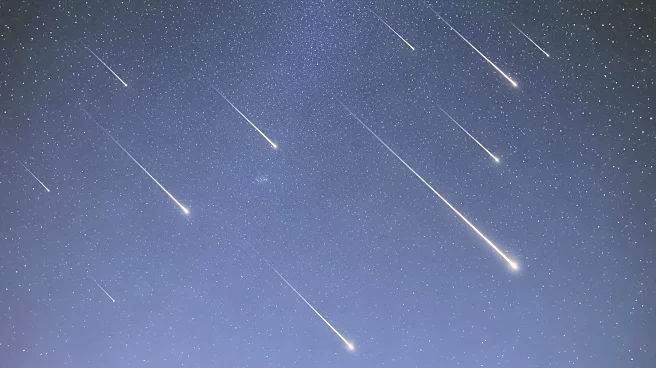What's Happening?
The Taurid meteor shower is expected to provide an impressive display of fireballs this week, with optimal viewing conditions anticipated on November 12. The Taurids, known for their long duration of visibility,
have been hindered by bright moonlight, but as the moon wanes, dark sky hours will increase. The shower, originating from debris left by Comet Encke, is characterized by slow-moving, yellowish-orange meteors. These meteors appear to radiate from the constellation Taurus, visible in the eastern sky after sundown. The Taurids are notable for producing bright fireballs due to larger debris fragments, offering a unique skywatching experience.
Why It's Important?
Meteor showers like the Taurids provide valuable opportunities for astronomical observation and public engagement with space science. The visibility of fireballs can enhance interest in astronomy and encourage educational activities related to celestial events. The Taurids' slow-moving meteors offer a distinct viewing experience, contributing to the understanding of cometary debris and its interaction with Earth's atmosphere. Such events can also inspire technological advancements in observational equipment and techniques, benefiting both amateur and professional astronomers.
What's Next?
As the moon continues to wane, skywatchers can expect improved conditions for viewing the Taurid meteor shower. The best viewing night is anticipated to be November 12, with several hours of dark skies before moonrise. Observers are encouraged to find locations with minimal light pollution to maximize their chances of seeing the fireballs. Additionally, the upcoming Leonid meteor shower, peaking on November 18, will offer another opportunity for meteor observation, with favorable conditions due to the moon's phase.
Beyond the Headlines
Meteor showers like the Taurids and Leonids highlight the dynamic nature of our solar system and the ongoing interaction between celestial bodies and Earth's atmosphere. These events can foster a deeper appreciation for the universe's complexity and inspire cultural and artistic expressions related to the night sky. The study of meteors contributes to scientific knowledge about cometary materials and their potential impact on Earth, informing both planetary defense strategies and space exploration initiatives.









